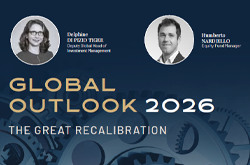Quando o impensável se torna possível
Monthly House View - Abril de 2025 - Faça o download aqui [PT]
Monthly House View - Abril 2025 - Faça o download aqui [BR]
Por vezes, as eleições provocam mudanças e 2024, ano em que se assistiu a eleições em países que representam metade da população mundial, será provavelmente recordado por isso mesmo. “Há décadas em que nada acontece e semanas onde acontecem décadas.” Esta citação resume o ambiente do início de 2025, em que a Alemanha, com o seu recentemente empossado chanceler, quebrou o travão da dívida. É um facto sem precedentes nos 35 anos decorridos desde a reunificação alemã subsequente à queda do Muro de Berlim, em 1989. A ortodoxia orçamental alemã foi flexibilizada e os critérios de Maastricht foram deixados de lado. É por isto que a Europa esperava desde há muito tempo e, as últimas eleições norte-americanas acabaram por atuar como o elemento catalisador. O impensável tornou-se, finalmente, possível!
Trata-se, claramente, de uma alteração radical na Europa. O mega plano da Alemanha consagrado à defesa e às infraestruturas vai tirar o país de dois anos consecutivos de recessão e deverá acelerar significativamente o crescimento nos próximos três a cinco anos. Nos Estados Unidos, a política de taxas aduaneiras introduzida pela administração Trump é suscetível de desencadear um aumento da inflação e de travar o crescimento mundial. Para além destes efeitos negativos, perspetiva-se uma grande alteração. A partir deste ano, a dinâmica de crescimento entre Europa e EUA deverá inverter-se, com a economia norte-americana a abrandar e a europeia a acelerar. Consequentemente, as taxas de crescimento das duas regiões poderão convergir a partir do próximo ano.
Durante o primeiro mandato de Donald Trump, os investidores relegaram para segundo plano a sua imprevisibilidade, a qual foi largamente compensada pelos cortes nos impostos e pela desregulamentação, que abriram perspetivas positivas para a economia. Hoje, a situação é radicalmente diferente. O “Trump Put”1 parece ter-se desvanecido, uma vez que a administração se concentra na implementação caótica de taxas aduaneiras e nos cortes no orçamento federal, que já envolvem mais de 100.000 postos de trabalho. Com a inflação e o poder de compra no centro das suas preocupações, os norte-americanos, na sua maioria, consideram que o Presidente não está a fazer o suficiente. Além disso, o anúncio de expulsões em massa de imigrantes ilegais, empregados, principalmente, na agricultura, na restauração e na construção civil, poderá exacerbar a falta de mão de obra e acentuar a inflação. A insatisfação aumenta. Atualmente, 52%2 dos norte-americanos desaprovam as políticas de Donald Trump, um aumento de 11% em apenas dois meses.
Nesta edição, destacamos o regresso em força da Alemanha e analisamos as repercussões da descida do teto da dívida. A subida das taxas e as perspetivas para as ações da zona euro dão novo alento aos investidores, especialmente àqueles que negligenciaram a região durante demasiado tempo. Estamos firmemente convencidos de que a diversificação continua a ser a estratégia mais eficaz para singrar neste ambiente volátil e imprevisível no curto prazo.
1 - Trump Put: reflete a perceção dos investidores de que a política económica e as declarações do presidente Trump poderão influenciar
os mercados de ações no sentido de limitar a sua queda.
2 - Sondagem Ipsos de 10-11 de março de 2025.
Monthly House View, 21.03.2025. - Extrait de l'Editorial
Monthly House View - April 2025 - Download here
Elections often bring about change, and the year 2024, when countries representing half of the world’s population went to the polls, is likely be remembered for years to come. “There are decades where nothing happens, and weeks where decades happen”. This quote aptly summarises the environment at the beginning of 2025, which witnessed Germany, with its brandnew Chancellor, breaking the debt brake. This is unprecedented since the reunification of Germany following the fall of the Berlin Wall in 1989. German fiscal orthodoxy has been relaxed, and the Maastricht criteria set aside, something Europe has long awaited, and the recent election in the United States has ultimately acted as the catalyst. The unthinkable has finally become possible!
This marks a clear and radical shift for Europe; Germany’s mega-plan on defence and infrastructure will pull the country out of two consecutive years of recession and is expected to significantly accelerate its growth over the next three to five years.
In the United States, the tariff policy implemented by the Trump administration is likely to cause a pick up in inflation and hamper global growth. Beyond these negative effects, a major upheaval is underway. Starting this year, the growth dynamic between Europe and the United States is expected to reverse: US growth is set to slow down while European growth is set to accelerate. Consequently, the growth rates of the two regions could converge as early as next year.
During Donald Trump’s first term, investors had relegated his unpredictability to the back seat, largely compensated by tax cuts and deregulation, which promised positive effects on the economy. Today, the situation is radically different. The “Trump Put”1 seems to have vanished, as the administration focuses on the chaotic implementation of tariffs and federal budget cuts affecting more than 100’000 jobs today. With inflation and purchasing power at the forefront of American concerns, a majority now feels the president is not doing enough. Furthermore, the announcement of mass expulsions of illegal migrants, who are primarily employed in agriculture, hospitality and construction, could exacerbate the labour shortage and worsen inflation. Dissatisfaction is now growing: 52%2 of Americans disapprove of Donald Trump’s policies, an increase of 11% in just two months.
In this edition, we highlight Germany’s comeback by examining the implications of the debt brake removal. The rise in interest rates and the outlook on equities in the Euro Area breathe new life into investors, particularly those who have neglected this region for too long. We are firmly convinced that diversification remains the most effective strategy to navigate this volatile and unpredictable short-term environment.
- Trump Put: The perception among investors that President Trump’s economic policies and statements could influence the stock
markets in a way that limits their downside.
2 - Ipsos Poll, 10-11 March 2025.
Monthly House View, 21.03.2025. - Excerpt of the Editorial
02 abril 2025




